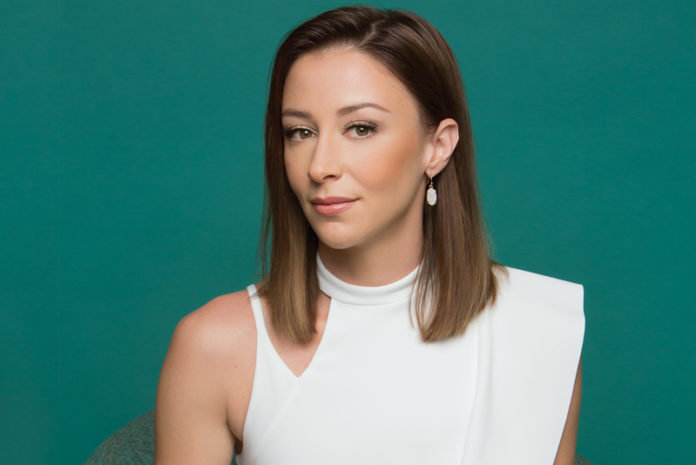Ashley Picillo helps cannabis companies create a thriving, legal economy out of a freewheeling black market.
Ashley Picillo is the chief executive officer and founder of Point Seven Group (Point7), a women-owned and -operated boutique cannabis consultancy based in Denver, Colorado, and Sonoma County, California. Founded in the fall of 2013, Point7 supports clients throughout the U.S., and soon internationally, in the pre-licensure processes, building high-performance teams, designing facilities and selecting equipment, as well as with post-operational activities such as developing standard operating procedures and branding and marketing.
The rising firm also is well-positioned to support the full spectrum of companies in the cannabis space, including those just embarking in newly regulated markets as well as established companies. Pioint7 boasts a team of professionals culled from traditional healthcare, branding and marketing, education, finance, graphic and web design, biochemistry, cultivation, and grant writing. Picillo recently shared her pride in her team and a few secrets to her success.
How did you get involved with the cannabis industry, and how was Point7 brought to life?
I started eyeing the cannabis industry in the fall of 2013 after moving back to New York following two years of teaching in Hawaii. I was itching to start a company, something I had been dead-set on doing most of my life, but the question remained: what to start and when? As I weighed the options, a strange series of events led me to Denver, where I found myself coordinating several cannabis projects, including the execution of a career fair boasting more than 2,500 attendees and forty cannabis businesses. Meg Sanders, the chief executive officer of Mindful and the event’s premier sponsor, was so pleased with the event that she offered me a position as [Mindful’s] director of marketing. I went back to New York to retrieve my belongings, and the rest is history.
Over the next eighteen months, my role grew to include dispensary management, sales, and operations—basically, the most epic cannabis crash course for someone like me. I remember the first time I sat down opposite Ry Prichard, my new colleague. He looked at me like I had six heads as I mapped out my vision with near zero understanding of the plant itself. But together we realized that what I lacked in cannabis knowledge, I made up for in execution—a perfect complement for a cannabis genius like Ry—and within a few weeks he and I were leveraging our respective backgrounds to build and implement operational programs that increased production, yield, quality, and overall sales.
I became obsessed with operations, constantly refining and tinkering with every single process. I’ll never forget the week I spent hunkered down in the extraction lab with Kind Bill, the head of extraction. I asked him hundreds of questions about every moving part, person, gauge, knob, and a lot of “whys.” I was relentless, and wanted to understand it all from the ground up. Looking back, I know how lucky I am to have had people around me who saw my potential and wanted to help me explore it further. [Those relationships were] my springboard.
Over time, I became as passionate about cannabis education as I was about operational excellence. I didn’t start off as a cannabis advocate but became one by connecting with patients, veterans, and far too many people who have faced both racial and social injustices because of our country’s dark history related to cannabis. As a former educator, I think it’s important that people hear someone like me sharing their honest “how I got into cannabis” story, because it is relatable to the many people out there who are still misinformed. Helping people find the truth amidst years of propaganda is by far the most rewarding part of the work we do.

Point7 works with a wide range of clients. How do you support them, and what sort of businesses do you intend to bring on in the future?
Our team and partners are extremely diverse in background and skill set, allowing us to work with a wide range of clients throughout the country. Our client list includes healthcare professionals, horticulturists, pharmacists, formulators, and cannabis pioneers. I’m privileged to have such a strong team: our incredible biochemist, Carolyn Burek, who has designed world-class extraction facilities and product lines; Shawna Weiman and Paulina Miasik, who have developed intricate systems and programs in several of the largest cultivation and extraction environments; Marilyn Seely, a seasoned marketing professional hailing from the complex world of healthcare, who has guided numerous clients through the brand-development process; and Lauren Devine, one of our senior account managers and technical writers, who has a true knack for making sense of state regulations. Collectively, we truly enjoy connecting with people interested in bringing this plant to the forefront of their respective state’s legislative agenda and working with clients to bring their ideas to life.
Beyond our core team, we have worked hard to establish a robust network of partnerships with various designers, security and greenhouse specialists, cultivators, and many leading brands. It took a lot of time and hard work to get here and it’s been a humbling experience, but I’m confident we’ve assembled one of the most approachable, powerful, agile teams in the industry.
What makes you and Point7 unique within the industry, and how will this fuel your 2018 plans?
2017 was an interesting year for Point7 in terms of both growth and lessons learned. Revenue-wise, we grew more than tenfold from 2016 to 2017, and we have established equally aggressive growth goals for 2018. To reach these goals, we’ve dramatically expanded our service offering, adding more comprehensive post-licensure operational support as well as a dedicated marketing division to offer a more complete “one-stop-shop” experience for our clients. In 2017, we moved into nine new markets, bringing our total state count to thirteen.
I attribute our success in 2017 and our “uniqueness” to three things: recruiting and hiring exceptional talent, building and leveraging strategic relationships, and adapting. Constantly adapting.
Questions about Point7’s future always make me laugh a little bit. Those who know me can attest to the fact that I always have a plan. Personal life, professional life—doesn’t matter. Having a plan is in my blood. I think my greatest strength is identifying where we need to go as a company and backwards-planning to the present, so I can outline every step needed to get there. Conversely, cannabis has forced me to get comfortable trashing the plan and pivoting to a stronger one.
Adaptability is key for any startup, but it is, in my opinion, the most important trait for a company that wants to be in cannabis for the long haul. In a world where regulations can change overnight, there is zero room for ego. You have to be willing to reexamine your vision and your ideas, poke holes in them, and admit when they are weak. While the exercise can be challenging, I can promise you’ll end up with a far better roadmap for your company if you’re willing to rip your own ideas apart and start over, as maddening as that can be sometimes.
What challenges may California face as it transitions into a regulated marketplace?
Despite their extensive history, I think California cannabis companies will struggle to adjust to the regulatory changes and steep compliance learning curve in the same way Colorado did. Most stand to learn a lot from the people and businesses who navigated regulations in other markets. While California pioneered so much of this and will continue to be at the heart of the industry, in many ways it trails behind Colorado and Washington in the area of compliance.
That said, companies like mine specializing in compliance have the ability to guide many brands through the process if we approach California with a great deal of humility and the willingness to learn. It is important to me as a business owner that we take the time to understand and appreciate California’s unique history, culture, and values as we embark on more work in the state. I know Point7 has a lot to contribute, given our team’s collective experience navigating regulated marketplaces, but we have just as much to learn.
I’m eager to connect with brands that see that two-way-street the same way I do. I want Point7 to give back to the communities where we live and work while paying homage to the many people who pushed the industry to where it is now. To that end, I’m excited to share that Point7 has partnered with two NorCal-based, established companies—Emerald Cup and Old Kai Logistics—to organize a fundraiser to benefit members of the community criminalized for cultivating or possessing this medicine. We haven’t set the date yet, so stay tuned for ticketing, venue, and sponsorship/in-kind donation information on our website, OldKai.com, and on TheEmeraldCup.com. Or, email me at [email protected].
How do you see yourself expanding in the future? Multiple offices? National brand? Expand into ownership?
I am so excited about the future of Point7. In January we expanded into NorCal and will be building out a greater team there to better support our California clientele. Beyond that, we will continue working alongside our existing clients while laying the foundation for expansion into new markets. I’m eyeing Canada, Germany, and Colombia at the moment, fingers crossed. Our marketing services division, most notably the packaging and labeling arm, is starting to take off in alignment with the new regulations in California, and for our clients recently licensed, I’d suspect we will have our work cut out for us helping to get these sites online within each state’s mandated timeline. 2018 is off to an exciting start.
I’m also in the process of launching two new endeavors. I can’t spill the beans yet, but I can tell you the first will create waves within the cannabis products arena, specifically for the female consumer. After working in so many different cannabis markets, our team recognized a growing need for female-focused products and thought, “Who better to address this need than a team of women who know how to operate, brand, and formulate?” It was off to the races from there, and I’m excited about releasing a formal update soon.
The second concept came about after a longtime friend and colleague, Sohum Shah, and I started examining public markets and the overlap with cannabis—specifically, how cannabis businesses are evaluated, where opportunities lie operationally, and how to better bridge access to capital. With so many cannabis companies conducting their own valuations, and even more investors in the dark about the types of opportunities that exist, we began developing a model that aims to solve these challenges. Our hope is that we can support the most viable cannabis businesses while encouraging greater participation among investors. While [U.S. Attorney General Jeff] Sessions’s announcement [rescinding the Cole Memo] created unrest for cannabis investors nationwide, I firmly believe the window for investors is now and the perceived risk, relative to the actual risk, is completely misaligned.

You authored Breaking the Grass Ceiling: Women, Weed, and Business, a collection of biographical stories about women in the cannabis industry. What about the subject intrigued you? Is there something special about women in cannabis?
I didn’t intend to build a completely women-run business when I started Point7. That happened organically, which, to me, illustrates how critical women are to the fabric of this industry. Throughout 2016, I became more aware of women’s work within the industry and, as a result, decided to pitch SXSW a panel called “Breaking the Grass Ceiling” to share some of these stories. I was wildly surprised to learn the panel was accepted and would be one of the first cannabis panels to take the main stage at SXSW.
Around this time, our SXSW contact person shared that, as a speaker, I could “put a book in the SXSW bookstore…if I had ever authored a book.” I called my colleague and lifetime friend, Lauren, and asked her to be brutally honest: “Can we write, publish, and print this book in forty-five days before the cut-off?” She paused and then said, “Yes. We need to start today.” We started scheduling the twenty-one interviews that day. Challenge accepted.
I’ve been asked why this borderline-crazy effort was so important to me. In truth, I simply believed these stories needed to be shared—most notably those presented by women who had been unfortunately ousted from the very companies they started, a disturbing trend I was not expecting to hear so much about at the outset of the project. Far too many women were sharing the same troubling story: The industry is shifting away from diversity and inclusion and toward a more traditional industry makeup of predominantly white men. I remember asking myself, and the women we interviewed, “How do we preserve the diverse makeup of this industry as it continues to grow?” As an extension of that, [I also asked,] “How do we create an industry without a ‘ceiling’ for both women and people of color?” I don’t have the answers, but I know it is a question all of us have an obligation to discuss, given the pioneering role women and minorities played during the earliest days.
We need to take action in day-to-day operational practices. Hiring personnel soon? Start by establishing a candidate pool composed of women and people of color. Engaging a contractor or consultant? Seek out veterans, women, minorities, and other diverse groups whenever possible. Acknowledging the extra effort often required of diverse audiences to have a “seat” at that same table as a non-minority business owner is an important first step in preserving the diverse culture our industry is built upon.
As for women and their ongoing role, don’t ever forget: This entire industry exists because of the female!
Point Seven Group: Cannabis Consulting Service













